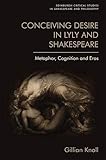Conceiving Desire in Lyly and Shakespeare : Metaphor, Cognition and Eros / Gillian Knoll.
Material type: TextSeries: Edinburgh Critical Studies in Shakespeare and Philosophy : ECSSPPublisher: Edinburgh : Edinburgh University Press, [2022]Copyright date: ©2020Description: 1 online resource (288 p.)Content type:
TextSeries: Edinburgh Critical Studies in Shakespeare and Philosophy : ECSSPPublisher: Edinburgh : Edinburgh University Press, [2022]Copyright date: ©2020Description: 1 online resource (288 p.)Content type: - 9781474428545
- 822.3 23/eng
- PR2659.L9
- online - DeGruyter
| Item type | Current library | Call number | URL | Status | Notes | Barcode | |
|---|---|---|---|---|---|---|---|
 eBook
eBook
|
Biblioteca "Angelicum" Pont. Univ. S.Tommaso d'Aquino Nuvola online | online - DeGruyter (Browse shelf(Opens below)) | Online access | Not for loan (Accesso limitato) | Accesso per gli utenti autorizzati / Access for authorized users | (dgr)9781474428545 |
Browsing Biblioteca "Angelicum" Pont. Univ. S.Tommaso d'Aquino shelves, Shelving location: Nuvola online Close shelf browser (Hides shelf browser)

|

|

|

|

|

|

|
||
| online - DeGruyter Multicultural Governance in a Mobile World / | online - DeGruyter Nietzsche's Unfashionable Observations / | online - DeGruyter Worldly Desires : Cosmopolitanism and Cinema in Hong Kong and Taiwan / | online - DeGruyter Conceiving Desire in Lyly and Shakespeare : Metaphor, Cognition and Eros / | online - DeGruyter Commemorating Peterloo : Violence, Resilience and Claim-making during the Romantic Era / | online - DeGruyter The Victorian Male Body / | online - DeGruyter Cinema, If You Please : The Memory of Taste, the Taste of Memory / |
Frontmatter -- CONTENTS -- Acknowledgements -- Series Editor’s Preface -- Introduction -- PART I: MOTION -- Introduction: The Physics and Metaphysics of Metaphor -- 1. The Erotic Potential of Idleness in Lyly’s Drama -- 2. The ‘Raging Motions’ of Eros on Shakespeare’s Stage -- PART II: SPACE -- Introduction: In Love -- 3. ‘A petty world of myself ’: Intimacy and Erotic Distance in Endymion -- 4. Binding the Void: The Erotics of Place in Antony and Cleopatra -- PART III: CREATIVITY -- Introduction: Erotic Subject, Object, Instrument -- 5. ‘Love’s Use’ in Campaspe -- 6. ‘You lie, in faith’: Making Marriage in The Taming of the Shrew -- Conclusion: Metaphorical Constraints: Making ‘frenzy . . . fine’ -- Bibliography -- Index
restricted access online access with authorization star
http://purl.org/coar/access_right/c_16ec
Explores the role of the mind in creating erotic experience on the early modern stageAdvances a new critical methodology that credits the role of cognition in the experience of erotic desire, and pleasure itselfExplores the philosophical underpinnings of erotic metaphors, drawing from ancient, early modern, and contemporary thinkers such as Aristotle, Giordano Bruno, Gaston Bachelard, Emmanuel Levinas, Kenneth Burke, George Lakoff, and Mark TurnerIlluminates the dramatic vitality of philosophical and contemplative erotic speechProvides the first full-length study that pairs John Lyly’s and William Shakespeare’s drama, uncovering new forms of intimacy in their playsTo ‘conceive’ desire is to acknowledge the generative potential of the erotic imagination, its capacity to impart form and make meaning out of the most elusive experiences. Drawing from cognitive theories about the metaphorical nature of thought, Gillian Knoll traces the contours of three conceptual metaphors – motion, space and creativity – that shape desire in plays by John Lyly and William Shakespeare. Metaphors, she argues, do more than narrate or express eros; they constitute erotic experience for Lyly’s and Shakespeare’s characters.
Mode of access: Internet via World Wide Web.
In English.
Description based on online resource; title from PDF title page (publisher's Web site, viewed 27. Jan 2023)


